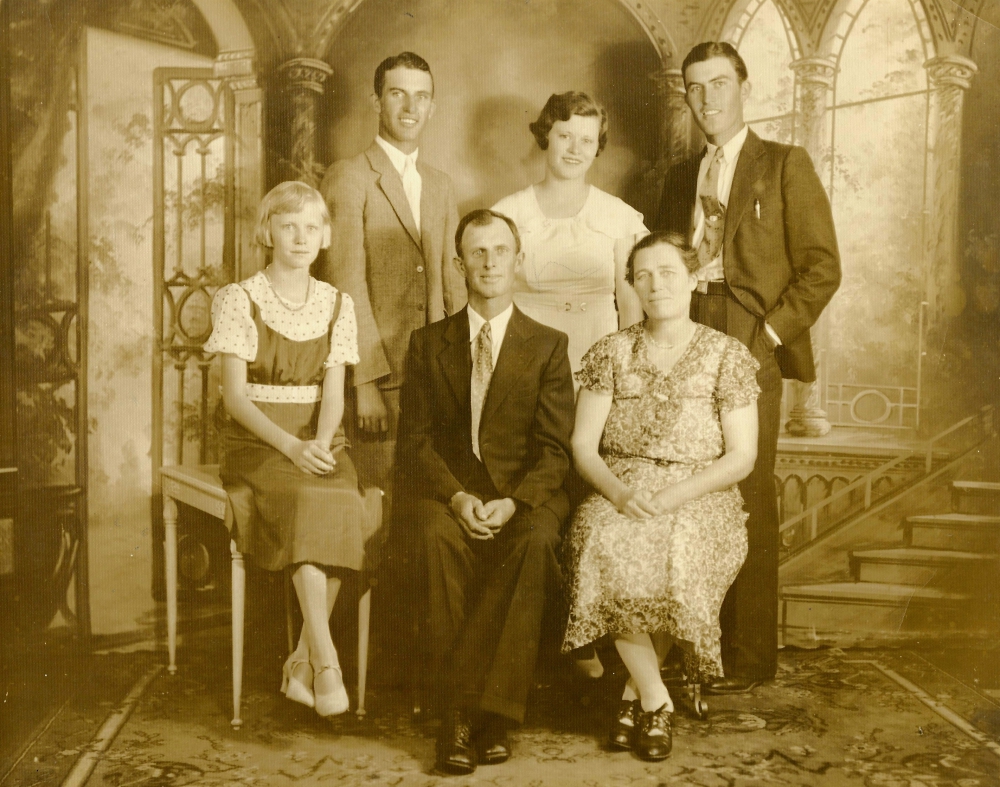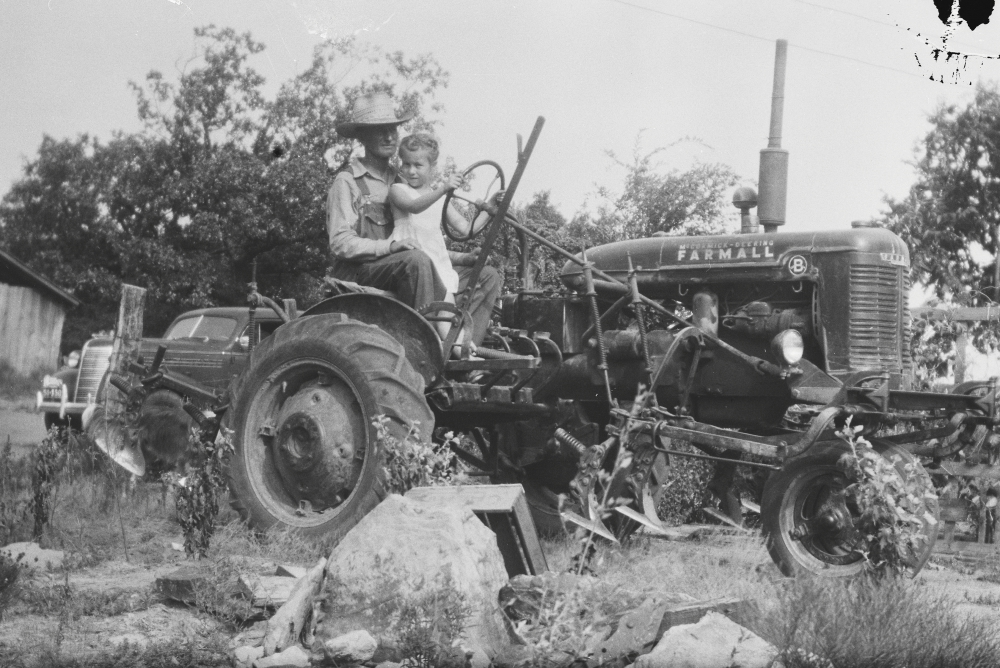
Blogs
Remembering Grandpa Smith
Wednesday, February 26, 2025 by Phyllis Smith Kester

Although a small, quiet man with little formal schooling, Grandpa Smith highly valued education for his children and left a big impact on this granddaughter.
C.H. Smith bought a farm on the outskirts of Wardville, Oklahoma, about ten years after marrying Walsie Arvelia Cobb on Christmas day after Oklahoma’s 1907 statehood. Grandpa bought that particular farm because it was close enough to a school for Buel (his 5-year-old) and Elvin (his 7-year-old) to immediately begin walking to school. Education was a high priority for C.H. and Arvelia. They resolved that all four of their children would not only graduate from high school but also from college in the 30s and 40s when few valued education that enthusiastically in rural America.
Why is this so amazing? Because it happened in spite of the Dust Bowl of the 1930s (the Dirty Thirties decade) when both boys entered college with sisters right behind them. In addition to the Dust Bowl, the Great Depression had began in 1929 and lasted about ten years. So this severe worldwide economic depression overlapped the impacts of drought. Afterwards, by 1940, more than two million people had relocated to the West Coast, many from Oklahoma.
Both decade-long events were problematic, but from a farmer’s perspective the eight years of extreme weather conditions that began in the summer of 1931 ruined farm communities. By 1934, seventy-five percent of the United States suffered unusually dry conditions and dust storms raged nearly everywhere. The most severely affected areas were in the Oklahoma and Texas panhandles, Kansas, Colorado and New Mexico.
That decade was a devastating chapter in American history that inflicted immense hardship because drought, dust storms, and economic ruin forced agonizing choices and tested the limits of human resilience. Fortunately, the rains did return by the end of the decade, and better farming practices were introduced to help with subsequent droughts.
Although my grandparents didn’t live in the area where farms and their topsoil were completely blown out by the wind, they still experienced the drought and blowing dust from those areas. Many experienced the blowing dust because occasionally the dust storms swept completely across the country to the East Coast. “Black blizzards” of windblown soil blocked out the sun and piled the dirt in drifts like snow. Cars come to a standstill, for no light could penetrate that swirling muck.
Imagine the terror as a wall of dust that’s thousands of feet high, engulfs your farm or town. That was the life for thousands during the Dust Bowl days. Families were often stuck indoors for extended periods, with little to do for this was before television and most didn’t have a phone.
Every once in a while it’d blow for a week before the dust stopped. No matter how tight your house was closed up, you could write your name in the dust deposited inside. Hence, young children, especially, slept with wet sheets over their cribs so that they wouldn’t breathe all that dirt. Parents sometimes placed a wet cloth over the face of their newborn and prayed they would live through it, some didn’t. Everyone lived with the dust, ate it, slept with it, and watched it strip them of what they had.
What did they have to eat—besides dust—during such a drought? Some literally lived on cornbread and beans with milk, if they could get it. I’ve heard of one family who ate lard and flour.
I don’t want to make light of the suffering that took place during that period. I’ve personally, briefly, experienced a sandstorm in West Texas a couple of times and found it was hard to breath, it hurt my eyes and stung my skin. It seemed to coat the inside of my nose and my mouth felt strangely dry and gritty. So, I cannot imagine how awful it was during the 1930s.
What can we learn from those who had the strength and determination to endured the Dust Bowl years which were one of the worst times in the midst of many “ordinary” bad times? My grandpa Smith was one of those survivors.
Grandpa was no ordinary man in several way, for example he did most of the calculating for the farm and everything else in his head. When his son, Buel, was taking math, he often asked his father about the answer to a problem when he was unsure of the answer—even when Buel was in college. Buel learned that his father served as an excellent answer book for checking his math answers even though grandpa Smith couldn’t do it on paper and didn’t know how he came up with the answer. My father, Buel, often marveled about how his dad could do this without any formal education.
In the mid-1940s I spent a summer at my grandparents’ farm. By then they were living alone in their weathered frame house on top of a hill overlooking much of their small farm. I loved to help feed the chickens, gather eggs, and walk with grandpa to the bottom of the hill to get the mail. I especially liked helping him milk the cows and feeding the cats. I would giggle when he squirted warm milk into the open mouths of the cats who rushed to line up for a drink of milk whenever he milked. Usually, the cats were covered with warm milk before it was over. They loved it and I did too. He showed me how to milk, but my hands weren’t strong enough to get much milk into the pail by myself. After finishing the other cows, he would place his strong hands over mine to help me squeeze. Grandma would let me help her churn the milk cream for butter, but I often tired before it became butter and Grandpa would finish the job. As I think back, I realize he was always quiet spoken and had immense patience in everything I witnessed.
From their front porch, we looked out on a field that had a pond at the bottom of the hill. One day that summer, grandpa and some men pulled their tractors and other machinery into the next field. Intrigued, I went to watch what they were doing. Afterwards, Grandpa started up his tractor to pull all the machinery to the next field. He swung me onto his lap to help him drive the tractor. My legs were too short for reaching the pedals from his lap. But I sat there feeling very important—he had a way of doing that.

As we slowly putt-putted along, he showed me how to steer the tractor down the middle of the dirt farm road—which I did until I realized his hands were no longer on the steering wheel with mine. I was horrified! I was actually steering the whole rig down the road by myself! I grabbed his hands, placed them back on the steering wheel, and refused to put mine back on for fear he might take his hands off again. For years he bragged about how I drove the tractor pulling the combine all by myself—even though I was not even school age. He was all for trying new things and letting children try new things in a protected setting.
Another day I was helping him in a back field. We were picking up rocks and carrying them to a rock pile in the corner. As we tossed our rocks on the pile, a large hairy brown spider about the size of my open hand jumped out of the rock pile and landed on the ground beside me. About as quick as the spider, Grandpa calmly said,
“Don’t worry, Honey. It won’t hurt you ‘cause it’s more scared of you than you are of it.”
I wasn’t too sure about that, but I stood my ground and watched it scurry off before asking, “What’s that?”
“A brown tarantula.”
Then he calmly told me what he knew about tarantula spiders. When we got back to Grandma, I told her about my encounter with a “jump’n” tarantula. She just laughed.
As I’ve thought back on that first tarantula encounter, I’ve realized his calm, matter-of-fact explanation kept me from being traumatized by a spider as large as even his adult hand. It was not WHAT happened, but HOW he responded that made the difference for me.
It has been the tarantula event that gave me perspective as I’ve looked at the lives of those who lived through the Great Depression and Dust Bowl. It was not so much WHAT happened to them as it was HOW they responded to it—and that’s what I want to learn from them.
It’s like when Daniel and his three friends (probably teenagers) were taken as captives by Nebuchadnezzar to a pagan Babylon. They couldn’t change much about their circumstances, but they had control over their character and responses. They could respond to their heathen conqueror with resentment and hostility, or respect and humility. (Daniel 1:3-20; 6:1-5) They didn’t control WHAT happened to them, but they did control HOW they responded. God blessed their efforts since they didn’t compromise, but did their best as unto the Lord.
Same with Grandpa Smith. He and Grandma knew they was not alone and completely trusted God to guide them for Jesus said if we follow Him, nothing can take us out of His hand. Grandpa knew God was in control and with him regardless of what happened. (John 10:25-30) No matter what their circumstances, he insisted his family of six go to the little Baptist church in their farm community and they volunteered to house and feed every missionary or preacher who came through their area. He wanted his children to have the opportunity to meet people outside their sphere and to learn as much as possible from school, God, and others.
Yes, Grandpa Smith and his family made it through the Great Depression, and the Dust Bowl that impacted Oklahoma, although his adult son J. Elvin died in 1938 from some physical malady. That difficult time revealed remarkable strength. Yes, the Dust Bowl stories include heartbreaking stories of loss. However, my Grandpa Smith and others are a testament to survival, and a powerful reminder of our dependence on God, the land, and how we should care for both.
Their lessons remain vitally relevant today because ordinary people coped with extraordinary circumstances. Their fierce determination and courage to survive during one of the worst hard times imaginable should give more of us insight and courage in our own hard times.
I will say of the LORD,“He is my refuge and my fortress; My God, in Him I will trust.” Psalm 91:2 (NKJV)
Comments
Helen Ann Spessard From C312 WCL At 2/27/2025 10:24:09 AM
Another interesting story from your childhood. Where you were raised on a Farm in the Southwest, I was raised in a Printing Plant and Retail Store. Different places and times for sure ! But here we are growing old together and surviving these "modern times".Reply by: Phyllis
So true, my friendPrevious Posts
Dreaming
Phyllis Smith Kester
5/21/2025
Tornado Alley
Phyllis Smith Kester
5/5/2025
Geodes--Part 2
Phyllis Smith Kester
4/23/2025
1940s in Oklahoma
Phyllis Smith Kester
4/8/2025
Buel Overcomes Adversity
Phyllis Smith Kester
3/24/2025
Buel Smith & Pitchers
Phyllis Smith Kester
3/11/2025
Remembering Grandpa Smith
Phyllis Smith Kester
2/26/2025
Meeting Corrie ten Boon
Phyllis Smith Kester
2/10/2025
Walking the Plank
Phyllis Smith Kester
1/28/2025
Train Ride in a Flood
Phyllis Smith Kester
1/13/2025
Saltillo Surprises
Phyllis Smith Kester
1/1/2025
Connecting Two Pictures
Phyllis Smith Kester
12/18/2024
Kintsugi Brokenness & Beauty
Phyllis Smith Kester
12/3/2024
Capillary Action
Phyllis Smith Kester
11/20/2024
A Forge and Anvil
Phyllis Smith Kester
11/5/2024
Tree Analogy #5-Bloom
Phyllis Smith Kester
10/24/2024
Tree Analogy #4: Brokenness
Phyllis Smith Kester
10/9/2024
Israel and Golan Heights
Phyllis Smith Kester
9/25/2024
Tree Analogy #3: Bent Tree
Phyllis Smith Kester
9/11/2024
Lesson From NASA
Phyllis Smith Kester
8/27/2024
Storm Warning
Phyllis Smith Kester
8/14/2024
Tree Analogy #2: Hanging Sod
Phyllis Smith Kester
7/31/2024
Tree Analogy #1: Angel Oak
Phyllis Smith Kester
7/17/2024
The Warning Shot
Phyllis Smith Kester
7/2/2024
Trip's Delayed Surprise
Phyllis Smith Kester
6/18/2024
Antelope Slot Canyon
Phyllis Smith Kester
6/4/2024
The Pioneer Woman
Phyllis Smith Kester
5/21/2024
What is a Woman, a Wife, or a Mother?
Phyllis Smith Kester
5/8/2024
Two Analogies
Phyllis Smith Kester
4/24/2024
Solar Eclipse Analogy
Phyllis Smith Kester
4/10/2024
EASTER
Phyllis Kester
3/26/2024
The Resurrection Plant
Phyllis Smith Kester
3/12/2024
Busted on Pikes Peak
Phyllis Smith Kester
2/27/2024
What is Love?
Phyllis Smith Kester
2/13/2024
Looking, But Not Seeing
Phyllis Kester
1/30/2024
Remembering Christmas 2023
Phyllis Kester
1/16/2024
The Potter
Phyllis Kester
1/2/2024
The Tree Ornament
Phyllis Kester
12/19/2023
Cockapoo Kristy
Phyllis Kester
12/6/2023
Surprises & Obsessions
Phyllis Kester
11/21/2023
Breaking Thru
Phyllis Kester
11/7/2023
Eagles
Phyllis Kester
10/24/2023
Facing Fear
Phyllis Kester
10/10/2023
The Bug-Eyed Monster
Phyllis Kester
9/25/2023
The Flash Flood
Phyllis Kester
9/12/2023
David's Library Book
Phyllis Kester
8/29/2023
Object Lesson: The Leaky Bucket
Phyllis Kester
8/16/2023
Turpentine Creek
Phyllis Kester
8/1/2023
The Surprise
Phyllis Kester
7/17/2023
Small Pleasures
Phyllis Kester
7/4/2023
Are Fathers Important?
Phyllis Kester
6/20/2023
Fathers and Father's Day
Phyllis Smith Kester
6/6/2023
Legacies of my mother, Hallie Hays Smith
Phyllis Smith Kester
5/23/2023
Hallie's Handkerchief Holder
Phyllis Kester
5/9/2023
A Voice from the Past
Phyllis Kester
4/25/2023
Object Lesson: The Crystal Paperweight
Phyllis Kester
4/11/2023
Grandma’s Quilting Bee
Phyllis Kester
3/28/2023
Actions have Consequences
Phyllis Kester
3/14/2023
Hungry Baby
Phyllis Kester
2/28/2023
Married to a Texan
Phyllis Kester
2/14/2023
Charley Kester’s Horses
Phyllis Kester
1/31/2023
Persistence In The Dirt
Phyllis Kester
1/17/2023
Object Lesson: Mushrooms in Our Life
Phyllis Kester
1/3/2023
Trip with Unexpected Twists
Phyllis Kester
12/20/2022
Grandma’s Important Legacy
Phyllis Kester
12/6/2022

